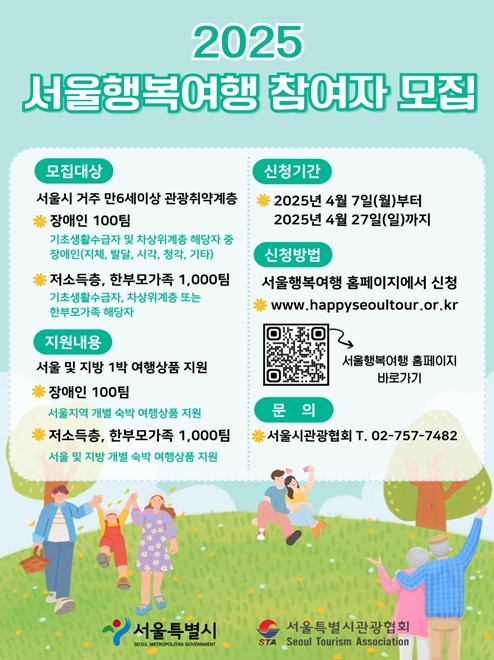The Seoul city government is recruiting 1,100 teams for the ‘2025 Seoul Happiness Trip,’ a free travel program aimed at citizens with limited travel opportunities due to economic or physical constraints. The recruitment period is from April 7 to April 27.
The ‘Seoul Happiness Trip’ offers a two-day, one-night travel package that includes accommodation, meals, transportation, and activities. Participants can choose between Seoul and other provinces. The package provides benefits worth up to 410,000 won for two people, and applications can be made for groups of two to four people depending on the number of participants.
The program targets those classified as ‘tourism-disadvantaged’ under the Tourism Promotion Act Enforcement Decree, specifically targeting Seoul residents aged six and older who are disabled, low-income, or single-parent families. The city plans to select participants by considering the proportional representation of welfare recipients, the second-lowest income groups, and single-parent families to ensure a balanced selection.
Seoul has been running this project since 2017, and last year, 1,484 teams totaling 3,306 participants took part in the program. This year, reflecting the demand from previous participants, a group trip program for disabled people to local provinces will be newly offered in the second half of the year (planned for August to September). This aims to expand travel options outside of Seoul and enhance communication and bonds among participants.

Applications can be submitted through the Seoul Happiness Trip website, and the final participants will be individually notified by May 21. The selected teams can access the website to book their desired schedule from the end of May to the end of November.
Jong-won Koo, Director of the Tourism and Sports Bureau of Seoul, stated, “Travel should be equitable for everyone. We will continue to expand the ‘Seoul Happiness Trip’ so that disadvantaged groups can also enjoy the pleasures of everyday life, and we will strengthen our inclusive tourism policies.”